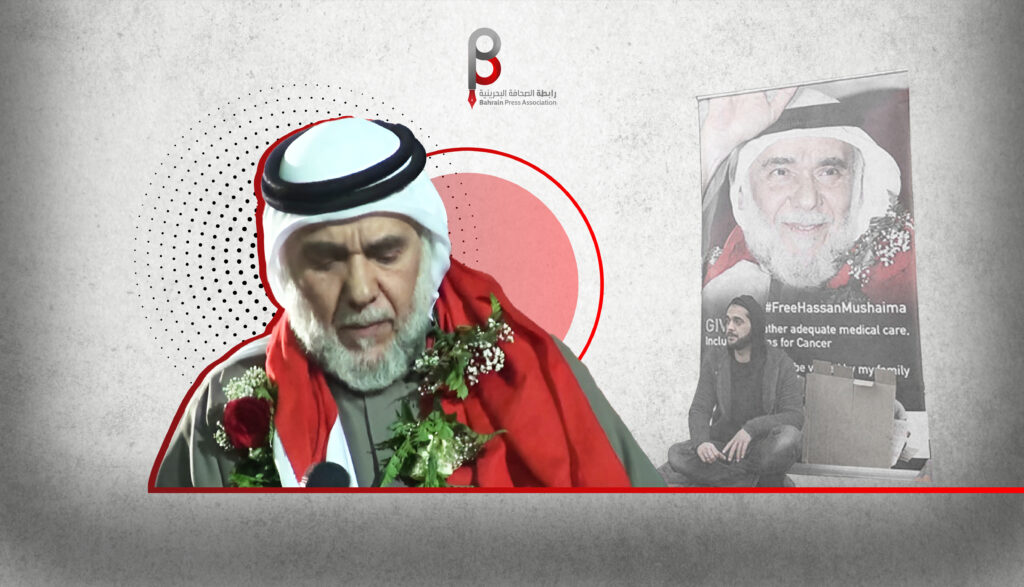Hassan Mushaima: A dignified septuagenarian who suffers from injustice and disease

Since his arrest in March 2011, prominent Bahraini opposition leader Hassan Mushaima has been subjected to retaliatory treatment for his outspoken views against the ruling regime in Bahrain. From ill-treatment and torture to medical neglect and harassment, Mushaima has suffered—and continues to—suffer from the injustice and cruelty of the political and security authorities.
Unlike most political prisoners who live a semi-routine life with limited harassment, the authorities continue to harass Mushaima in various ways. Mushaima suffers from a political revenge party that state officials do not want to end.
Hassan Mushaima, a seventy-year-old man, is in a special situation due to his old age and the accumulation of aging diseases and his suffering from cancer. It is noteworthy that Mushaima was on a medical trip to the United Kingdom before he returned to the country in 2011 to participate in the Pearl Roundabout protests.
As Mushaima received a harsh prison sentence for his political stance, he and his family continued to demand cancer screenings and regular access to medication, which the authorities briefly responded to before reneging on their promises, and Mushaima and his family returned to the same demands. Mushaima’s health condition deteriorated significantly three years ago, forcing his son Ali Mushaima, who lives in the United Kingdom, to go on a hunger strike in front of the Embassy of Bahraini in London, after he and his family exhausted all possible means to deliver messages to those concerned.
In July 2021, the authorities decided to transfer Mushaima to the Kano Health Center for a number of medical examinations and follow-ups, but what seemed to be a routine matter turned into a permanent one, and Mushaima remains in what looks like isolation in the Kano Center as if he is in solitary confinement.
Mushaima’s family says that the authorities had him do a number of medical tests, but refused to inform him of the results “due to lack of security approval.” As a result, his health status remains “hazy” and cannot be predicted or accurately known.
Mushaima and his fellow opposition figures completed their thirteenth year behind bars. No one could have imagined in 2011 that this crisis would continue for more than a decade, with no signs of a real breakthrough.
Mushaima, who is 76 years old, is still subjected to harassment and medical neglect in the Kano Health Center, where he has been staying for more than two years away from fellow opposition leaders who are serving their sentences in Jaw Prison, which is a psychological pressure factor that he feels and expresses during phone calls to his family.
Last December (only three months ago), Mushaima was forced to go on a hunger strike due to the conditions of his detention and his unclear health status. In a phone call with his family, he said that the authorities were preventing him from acquiring personal hygiene items such as soap, shampoo, and toothpaste.
Over the past years, the authorities have proven that their founding of this whole range of institutions: the General Secretariat for Grievances, the Commission for the Rights of Prisoners and Detainees, and the National Human Rights Institution, have been little more than a formality and are not particularly effective in addressing the concerns of political prisoners in particular.
The continued reprisals against Hassan Mushaima are not appropriate for any government to carry out.
The authorities are called upon to, instead of restricting Mushaima, who is almost eighty, release him, so that he stays with his family and receive the health care he needs.
The government of the United Kingdom, the United States and the European Union, for their part, should exert pressure on the government of Bahrain, their ally, in order to end the suffering of Hassan Mushaima, by releasing him and ending this tragic cycle of revenge and healing for a sick and exhausted man.